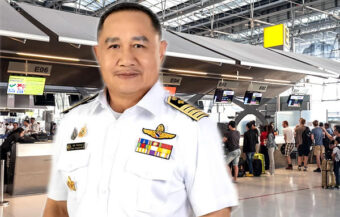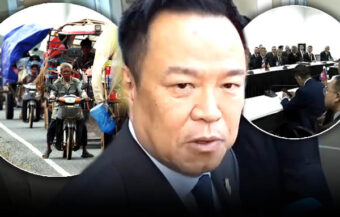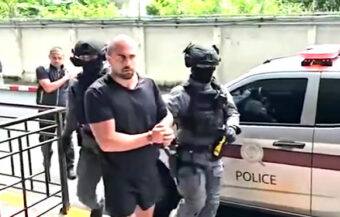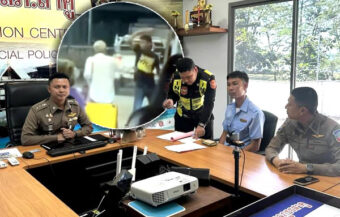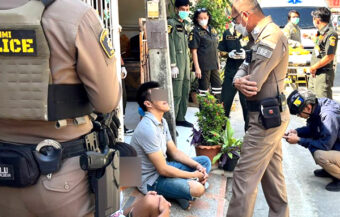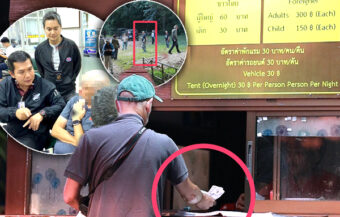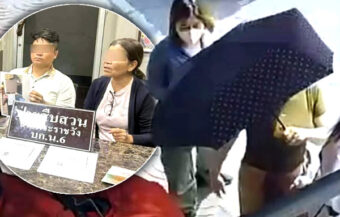New Economic Centre established this week and plans to be put forward by the Minister of Public Health to build a vaccine factory show Thailand has, in its sights, some sort of end game to restore the kingdom and its economy to a ‘real’ normal and end the current nightmare. But it will not be easy with fear itself already doing damage. A leading psychiatrist working with the government has also warned that the next wave may well be a mental health one.
A Thai medical expert wants the Thai government to stop the current influx of foreigners into the kingdom that has been ongoing, with some success, through a special arrangement with the Ministry of Foreign Affairs in recent months. This comes as Thailand appears to be grappling between fear of the virus and the necessity of finding an end game while attempting to relaunch its economy.
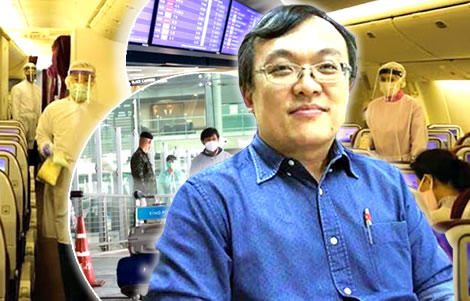
A leading Thai medical expert is calling on the government to halt and suspend its relatively successful programme, currently up and running, which allows a range of foreigners with links and ties to the kingdom to return at enormous expense, sometimes costing $5,000 to $6,000 and in compliance with a strict and demanding regime.
This entry regime, administered by the Ministry of Foreign Affairs, is turning out to be a lifeline for many hotels in the kingdom facing bankruptcy while others queue up to host foreigners as part of the alternative quarantine scheme run in conjunction with Thailand’s Ministry of Public Health.
Thai Airways helping to fly passengers back to Thailand even as it faces court scrutiny this week
Such is the success of the scheme that Thai Airways, facing a crucial bankruptcy hearing before the courts on Monday 17th August, when its survival plans will be presented, has been taking part in full repatriation flights from world capitals to cater for the demand. Seats on the flights are paid for by passengers at a premium to normal market conditions.
The current programme involves Thai nationals returning to Thailand with foreigners. The Thai returnees have the alternative of availing of free state quarantine or paying for the more luxurious alternative quarantine scheme which is the only option for foreigners and can cost anywhere from ฿35,000 to ฿145,000 for the 14 days supervised quarantine at a range of participating hotels.
Calls for Thai nationals to also pay for quarantine to save costs and support tourism business concerns
This has led to calls by some Thai officials, based on the ongoing cost of state quarantine, to make returning Thai nationals also pay for their quarantine to save the Thai state costs and make the scheme both more equitable and more profitable in order to support Thailand’s participating hotels and severely challenged tourist industry.
However, Thai public opinion sees this as anathema but the support given by returning foreigners to the repatriation of Thai nationals and the tourism industry is beginning to be acknowledged and noted.
Moves are now underway to increase the daily processing quota upwards from 500 passengers per day including Thais and foreigners.
However, on Saturday, it is reported that Professor Thira Woratanarat, an expert in preventative medicine at Chulalongkorn’s University’s Faculty of Medicine, has called on the government to halt all non-essential travel to the kingdom by foreigners.
The doctor also called for any tourism-related travel bubble initiatives to be postponed for at least 6 months.
Top doctor warns that over 100,000 people entering may pose a risk as Covid 19 positive rates in quarantine appear to have increased
Professor Thira points to his own calculations which anticipate up to 100,000 passengers will have availed of the re-entry route into Thailand in the last three months of the year.
This may be even higher as Thai authorities ramp up the system with more hotels applying to participate and as the government cautiously widens the eligibility criteria for those who seek to enter the kingdom while insisting on the mandatory 14 day quarantine period.
The Thai medical expert says that he is concerned at the numbers currently testing positive within quarantine.
On Friday, there were reported to be 17 people, all Thai returnees who had tested positive for the Covid 19 virus. 17 were from India while two were Thai men from Australia and the United States respectively. All tested positive within state quarantine facilities.
Detection may point to the efficacy of the current screening and quarantine provisions in place
However, in recent weeks, as the number of foreigners arriving through the tortuous and expensive process of entry has risen, there have been some who have also tested positive within the alternative quarantine scheme which, of course, tends to show the efficacy of the system and its raison d’être.
It is not clear why the Thai doctor feels that the number of foreigners arriving into Thailand should be limited at this point. He disclosed that his calculations suggested that 500 of those arriving may not have been properly screened.
All incoming passengers, both Thai and Foreigners, rigorously tested and screened even before they fly
However, all foreigners availing of the entry programme must undertake several certified tests even before flying to Thailand, a process which is scrupulously supervised by officials at the relevant Thai embassies worldwide before certificates of entry are issued.
Arriving in Thailand, on the especially approved flights, the arrivals must also undergo another rigorous screening and testing process before being taken to their alternative quarantine scheme quarters where they are placed under medical supervision and strict security for the full duration of their stay.
Risk is increasing says doctor and Thailand may yet be hit by the virus as happened this week in New Zealand
Despite this, Dr Thira maintains that the risk of an outbreak of the Covid 19 virus again in Thailand is increasing.
In New Zealand, this week, we have seen an unexplained outbreak in Auckland which has now grown and spread despite that country’s hitherto perfect record and strict entry requirements.
Experts are suggesting that the outbreak in New Zealand may be linked to incoming trade products such as frozen foods, something which all countries have previously not controlled and which, incidentally, could have dire repercussions for Thailand’s lucrative export market for fish and seafood products.
Nothing is confirmed but experts suggest that those who consumed the frozen products later became infected and spread the virus.
One of those in New Zealand who was first infected worked at a company engaged in the importation of frozen foods.
Supporting this theory are reports from China revealing that the virus has been detected on frozen shrimp and chicken wings from Ecuador and Brazil.
Thailand’s end game. What is it?
Some observers in Thailand, in recent weeks, have been asking what is the Thai government’s end game in this emergency?
Given the devastating impact the current measures are having on the country’s critical foreign tourism industry and wider economic prospects, it is a reasonable and timely question.
This includes warnings from respected officials in the health sector who suggest that mental health problems in the kingdom are skyrocketing.
Ministry of Public Health expert warns of a new ‘mental health’ wave due to the coronavirus’s impact on the Thai population over an extended period
In recent months, another doctor, Dr Varoth Chotpitayasunondh who works at Thailand’s Ministry of Public Health and is a trained psychiatrist, has questioned if the government is ready for the next wave of effect after it appears to have effectively controlled the spread of the Covid 19 virus.
‘The next wave of the problem will be mental health,’ he warned.
Added to this is the economic damage and the continuing health threat that may never go away.
Volunteer groups and workers throughout Thailand, since April last, have noticed a remarkable rise in suicide and attempted suicides.
A survey by Chiang Mai and Chulalongkorn University at the height of the Covid 19 threat in Thailand at the end of April, showed that as many people had died from suicide strictly attributed to the virus itself as the virus during that month and that means certainly thereafter, as there were only seven more deaths from Covid 19 in the intervening four months.
In the first three weeks of the national emergency, that figure was 38 people over and above normal suicide rates and particularly due to the virus emergency.
92% of those were self-employed and 71% were men.
Medical experts have dominated Thailand’s approach since the end of March to fight off this virus
The Thai government and its policy advisors with the Centre for COVID-19 Situation Administration (CCSA) have dominated all decisions in Thailand since the state of emergency was called.
This has meant a firm and unwavering emphasis on health policy first and foremost which is, together with its historic experience and organised approach to fighting health threats, likely why Thailand is perhaps within a handful of countries with such an impressive track record.
The problem may be that, as of now, the country is fixated on preventing a second outbreak or the dreaded second wave above all other considerations.
However, the fears raised by Dr Thira have been added to this week also by another medical expert and indeed a colleague of his at Chulalongkorn University.
Dr Thiravat Hemachudha is the director of the Health Science Centre of Emerging Diseases at the respected institution.
Professor and Neurologist warns of virus mutation
Firstly, this medical expert appears to dismiss the theory that the Covid 19 virus was manipulated at a research laboratory in Wuhan China, a possibility that the US and UK intelligence services have raised as a real one and provided some evidence for without coming to a conclusion at this stage in their assessment.
The evidence put forward suggested an emergency evacuation at the Wuhan facility in mid-October of last year from October 7th to October 24th.
The evidence consisted of cellphone activity which was reviewed by the US intelligence service but they could not confirm that the facility was shut down.
Dr Thiravat Hemachudha is also a professor and acknowledged medical expert being a neurologist with particular expertise on rabies. On this speciality, he is also a member of a World Health Organization panel.
The WHO and many scientists still insist that the virus most likely spread from a wet market in Wuhan dealing in wild species including bats.
This week, the Thai doctor warned that new studies on horseshoe bats carried out in China and Vietnam suggest strongly that human consumption of the bats was the key cause of this virus.
This raised a disturbing prospect which Dr Thiravat pointed to. Such research has consistently noted that the virus is evolving including ongoing changes to its genetic code. He points out that this may impact efforts at screening and testing for the threat as we go forward.
New Economic Recovery Centre may see a change of thinking by the government and the Prime Minister
This week, the Thai government, in a signal that may suggest that it is looking more seriously now at the economic challenges, the economic imperative and perhaps a more balanced approach seen by necessity in all countries worldwide, established an economic recovery centre with up to 22 committees reporting to Prime Minister, Prayut Chan ocha.
The government’s new economic team and Minister of Finance, Predee Daochai may, at some point, see the need to look seriously at how Thailand expects to ultimately come out, economically, of what still remains a national lockdown from the rest of the world.
This may be influenced by trends worldwide which are showing that while infection rates are rising as economies are ramped up, deaths and hospital emergency ward statistics in already hit countries bear no resemblance to those seen during the first wave while on the other hand, in US states that have previously been spared the ravages of the first wave of the virus, they are higher. This may not be good news for Thailand.
Sweden’s approach may be working
Significantly, in Sweden, which adopted a light-handed approach to curtailing the virus and which did not shut down its economy, the infection rate has dropped dramatically in recent weeks without any change in policy as have hospitalisations.
The death rate has decreased to one to two people per day. Some medical experts are attributing this to a similar effect to herd immunity although this has not been confirmed.
The reduction in infections and deaths in Sweden has come, also significantly, at a time when there has been less social distancing in the country over the summer period when people holiday and socialise more as they are perfectly free to do.
Jan Albert is a Swedish professor and senior consultant in infectious disease control and virology.
He explains what he thinks is happening there like this: ‘My guess, although it’s only a guess, is that we do see an effect of immunity of some type even if it’s not revealed in the proportion of people testing positive for antibodies.’
5,783 lives lost – a high price to pay
However, even if Sweden is now emerging free of the virus, the number of deaths in the nordic kingdom with a population of just over 10 million, roughly 14% the size of Thailand, has seen 5,783 lives lost.
A similar outcome in Thailand would have seen 41,500 people dead. We will also have to wait to see what happens in Sweden’s winter months. This will be the real reckoning.
This sobering figure can be pointed to by Thailand’s medical experts such as Dr Thira who have steered the kingdom to a death rate of 58 even as the economic imperative rears its head, as it must.
This may suggest that there is, indeed, some justification for the government’s tough policy which may lead to Thailand waiting for the virus threat to be subdued outside its borders or for a vaccine programme to be implemented throughout the kingdom before a return to normal life, trade and commerce can happen.
End game for Thailand – vaccine factory
This week, the Minister of Public Health, Anutin Charnvirakul, has set out a proposal, which has still to be sent to the cabinet for consideration.
The plan calls for a budget of ฿600 million to fund a joint vaccine development initiative between Thailand and Oxford University which is known to be at an advanced stage of testing and obtaining a vaccine for the UK population.
Preparations in the UK are progressing swiftly with factories being built and thought being given to administering 70 million vaccinations against the Covid 19 virus including keeping the vaccination doses refrigerated.
The Thai proposal to be considered by the cabinet also includes plans to develop and build a Covid 19 vaccine factory in Thailand.
Get all our latest stories, follow Thai Examiner on Facebook here
Further reading:
Foreigners arriving in Thailand in now increasing numbers targeted by a fake news campaign online
Visa amnesty agreed as emergency decree is linked to the controlled entry of Thais and Foreigners
Homeless people sheltering in closed Pattaya beer bars – Pattaya News report
Mystery Egyptian military flight revealed as exposing Thailand to the Covid 19 virus in Rayong
Agony for stranded western foreigners as ‘Fast-track’ Chinese charter flight jets in from Shanghai
Only 2,000 foreigners have yet registered to be reunited with love ones as tourism to also reopen
Key ministries met on Sunday to discuss access by foreigners to the kingdom and a tourism relaunch
Thai public says No to foreign tourism and also predicts 1 to 2 years for travel to return to normal
Only hope for foreigners locked out of Thailand as easing continues with strict controls on entry
Ministers suggest an easing of the travel ban for some tourists but a continued state of emergency
Thai security chief suggests a full reopening of the kingdom to international flights from July 1st
Australian man’s heartbreak cut off from his Thai wife – begs to be included on repatriation flights


